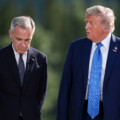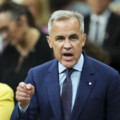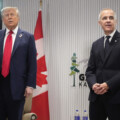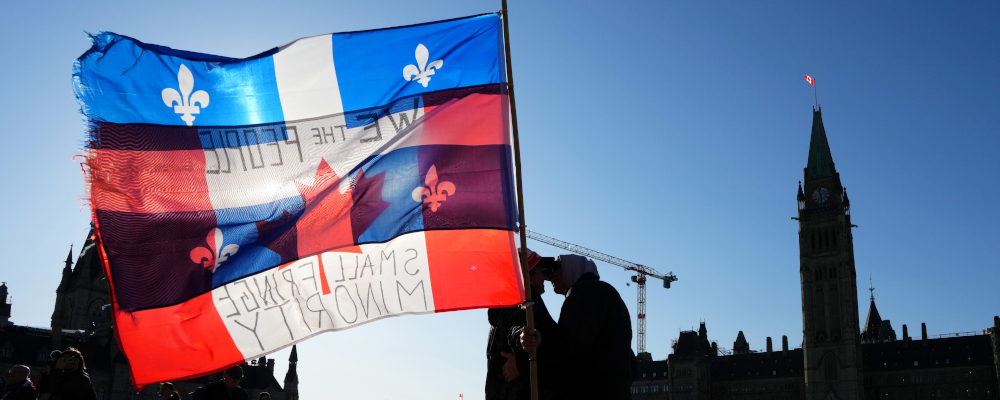The following is an excerpt from Andrew McDougall’s latest book, Sleeping Dogs: Quebec and the Stabilization of Canadian Federalism after 1995.
On the night of the Quebec sovereignty referendum in 1995, after coming within a whisker of victory, the former Parti Québécois (PQ) premier of Quebec Jacques Parizeau told a large crowd of supporters that they would not have to wait another fifteen years for another chance to vote for independence. In light of the very close result, he assured them their next chance was only just around the corner and they would very soon have another opportunity to take Quebec out of Canada. Now, almost thirty years later, that “next chance” has yet to come and it is nowhere in sight. The Quebec sovereignty movement has found itself increasingly leaderless and rudderless and searching for a new basis to justify its mission. What happened between 1995 and now? That question is the central puzzle of this book.
The answer is twofold. The first involves a change in federalist strategy: federalist Canadians and Quebecers chose a course of action that became an imperative after 1995 but would have been unthinkable in the middle of the twentieth century—drop the subject. They did not solve the “Quebec question,” and federalists continue to hold deeply conflicted views on what the country is really about. Even to this day Quebec has never “signed” the constitutional package of 1982. But, recognizing that any attempt to resolve the problem of Quebec’s place in Canada would lead to almost certain disaster, federalists of every stripe decided to leave the question alone. They successfully depoliticized the subject and changed the political agenda to other, less existential topics.
That alone was not enough, however. Fortuitous political, social, and cultural currents that changed in Canada enabled them to pick this course of action, and this is the other side of the story. Five different explanations have been proposed for why the momentum went out of the sovereignty movement in Quebec, which gave federalists their chance to change the subject. This book dedicates a chapter to each one: constitutional fatigue, non-constitutional accommodation for Quebec, Quebec’s changing identity politics, generational change, and finally economic globalization. What is important to understand at the outset is that there is no one explanation. This phenomenon is multicausal. Taken together, they help us understand better the evolving situation in Quebec and Canadian federalism. Conceptually, the book argues that the country’s federalist political elites have capitalized on these developments to stabilize the country by simply dropping the national question—even when they might still hold very different visions of the Constitution. Alongside these greater forces, much of the momentum that the secessionist movement had in the late twentieth century has not carried over into the twenty-first.
In focusing on the conduct of elites managing the country, alongside these otherwise fortuitous political currents, the book contributes the constitutional theory of abeyances. This concept refers to situations in which political leaders refuse to engage in political conflicts that are so existential that, once politicized, can only be resolved with one of those visions “losing” to the other in a constitutional crisis. To that extent, this book connects the abeyance literature to that of agenda-setting—federalists have taken advantage of improving political conditions to focus on other things as much as they can. Sovereigntists who support Quebec independence have struggled to justify their project and to generate the political support they need to elect parties like the PQ and to find the “winning conditions” required to hold and win a vote on independence.

Federalists have done nothing to upset the status quo, refusing to be drawn into significant constitutional fights with Quebec or to do anything that might stir up a sense of outrage against the rest of the country. Recognizing the morass that constitutional politics have been over the course of Canada’s history, federalists, whether they be from Quebec or the rest of Canada, have refused to engage. The decision to play up or play down a political issue rests in particular with political leaders; they are policy entrepreneurs who can decide what they want their governments to focus on. Over the past twenty-five years, no Canadian prime minister, and no Quebec premier who was not otherwise leading a PQ government, has suggested any interest in reopening the national question. Leaders like Jean Chrétien, Paul Martin, Stephen Harper, and Justin Trudeau have been loath to engage in constitutional fights with Quebec. But this has been matched by a similar reluctance on the part of Quebec premiers Jean Charest, Phillipe Couillard, or François Legault. The attitude of these leaders stands in contrast to the priority that was given to the Constitution by an earlier generation of leaders like Brian Mulroney, Quebec premier Robert Bourassa, and above all Pierre Trudeau, who felt there was an urgency to resolve constitutional disputes in order to preserve national unity.
The conflict at the root of the Quebec-Canada debate will be familiar to students of Canadian politics as the so-called contract-compact debate between Quebec and Canada. In Quebec, federalists and sovereigntists alike tend see the country as a union of peoples, equal in status and powers, which has important implications for the powers that the province thinks it should have under the Constitution. The rest of the country generally does not accept this argument, viewing Canada as closer to a contract of provinces, of which all are equal in status and powers. The failure to reconcile these positions has driven the national unity crises from the patriation debate in 1980 through to the Meech Lake and the Charlottetown Accords, as well as the two referendums on sovereignty association in 1980 and 1995.
No longer. While the secessionist leaders contend with the decline of their movement, federalists, even those who disagree, have tried to move on and avoid becoming drawn into yet another debate over Quebec’s place in the country. This unwillingness can be seen, for example, in the shared reluctance of the Quebec Liberal Party (QLP) and the federal Conservative Party to be pulled into a discussion about constitutional issues. The QLP, which views Canada as a compact of nations, has a very different view of Quebec’s place in the federation than does the federal Conservative Party, which historically has adhered to a more contractual view of provincial equality since it combined with the Canadian Alliance in 2003. Neither has expressed as much interest in squarely tackling the subject over the last two and a half decades as they did in the last two decades of the twentieth century. In doing so, they show that the proverbial genie can be put back in the bottle, at least for now. To put it differently, the national question is in abeyance until something, or someone, upsets the status quo.
Recommended for You

The Notebook by Theo Argitis: Trump halts trade talks, Carney’s trade-offs and John McCallum’s legacy

Lydia Perovic: The future of history looks bleak, if Toronto’s museums are any indication

The Weekly Wrap: The Liberals must abandon their internet regulation agenda

‘A direct attack’: The Roundtable on Trump’s surprise trade announcement and Canada’s immigration debacle



